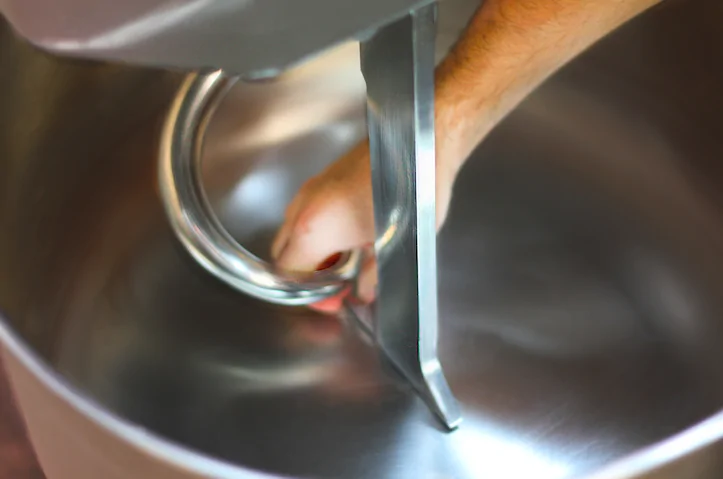
In every pizzeria beside the oven you will find the dough mixer! These two pieces of equipment are essential in every pizzeria and bakery. There are three different types of dough mixers commercially available:
– Fork Mixer
– Twin arm Mixer
– Spiral Mixer
The most widely used for pizza dough are the twin arm and the spiral mixer for their ability to oxygenate the dough and create a tight gluten mesh, giving better structure to the dough and allowing flour hydration (up to 100%).
The fork mixer, despite its success in the past the is now not widely used by the pizza chef. One reason is that it is a slow mixer (increased heat energy) and it can only mix dough with water content up to 58% – 60% maximum. The other reason why the fork mixer is in decline is due to the advancements in the spiral mixer – the pizza world and market has evolved, pizza chefs now have more knowledge and approach dough-making in a different way. They are less likely to follow the crowd and more inclined to research and learn themselves.
We will look at the twin arm mixer later in a future blog and for this one we wish to concentrate on the spiral mixer.
Used in both artisan and industrial environments the spiral mixer is a machine that mixes flour with water, yeast and other ingredients.
The spiral mixer consists of a steel cylindrical-shaped bowl with a shaft in the middle and a steel spiral which is the main working organ. What distinguishes this machine from the planetary mixer is the double movement. Both the bowl, which rotates clockwise or anticlockwise on its axis during the mixing phase, and the spiral that rotates around its vertical axis. This double movement therefore facilitates the kneading, making it soft and homogeneous. To give greater elasticity to the dough is the fixed central shaft, that is, a dough-breaker arm that prevents the compound from becoming a single block of dough.
The spiral mixer is recommended especially for dough that needs a good structured mixing process, such as soft doughs, for example that of bread or pizza.
Which type of Spiral mixer to choose for Pizza?
There are hundreds of different spiral mixers commercially available on the market with different dough capacity and different prices. So, which one is the best mixer?
Benjamin Franklin once wrote:
“The bitterness of poor quality remains long after the sweetness of low price is forgotten.”
Using a professional spiral mixer has its tangible and certainly quantifiable advantages. A professional spiral mixer is certainly vital to support an important amount of work, having a more robust motor and more suitable to continuous use daily.
Other features that distinguish a professional mixer from a medium-low end one concerns the materials and strength. Weight is certainly a factor that offers an indication regarding strength and components but observing the quality of materials used in the production is an important part of an analysis that should be as accurate and thorough as possible. In a professional machine designed for use in pizzerias., the bowl, the rotation shaft, are all components produced in heavy duty stainless steel.
The spiral, which generates a pressure from top to bottom (based on the shape of the spiral itself), and the presence of a central shaft that serves to hold and better expose the dough to the spiral itself. The spaces/distance between spiral and shaft in a high performance mixer is very tight.
The round bowl in heavy duty stainless steel helps to gather the flour from the bottom of the bowl, moreover the heavy duty stainless steel bowl reduces the vibrations to a minimum, lowering the heat during the kneading phase. The more economic mixers tend to overheat the dough much more compared with a more expensive, professional mixer.
SINGLE SPEED OR DOUBLE SPEED?
Another important factor to be assessed is the speed. Professional high-performance spiral mixers have 2 speed or in certain cases there are some machines you can regulate the speed of the bowl and spiral up to 18 different speeds.
Having the option to change the speed is essential in order to produce high hydration dough or indirect method such as using “biga” or sourdough. In most top range spiral mixers with more than one speed, they will be equipped with a bowl-reverse system which allows the bowl to rotate in both directions. This is vital to create “biga” or to help take the dough out from the mixer once it is ready.
The first speed is generally used for the initial mixture of ingredients, the second for giving structure to the dough creating a stronger bond between the gluten’s proteins. Moreover, it helps to oxygenate the dough giving a bigger volume to the final products.
In summary, using a professional high-performance professional mixer allows us to:
– Make every kind of dough easily.
– Obtain more yield from our flour.
– Have longer shelf life in our dough.
– Reduce the mixing time.
– Increases quality and consistency of our dough.
– Increases profitability and productivity.
“For me, it is a simple recommendation to make and that is, if you want to run a professional pizza business – buy a professional mixer!”
– Davide D’Auria